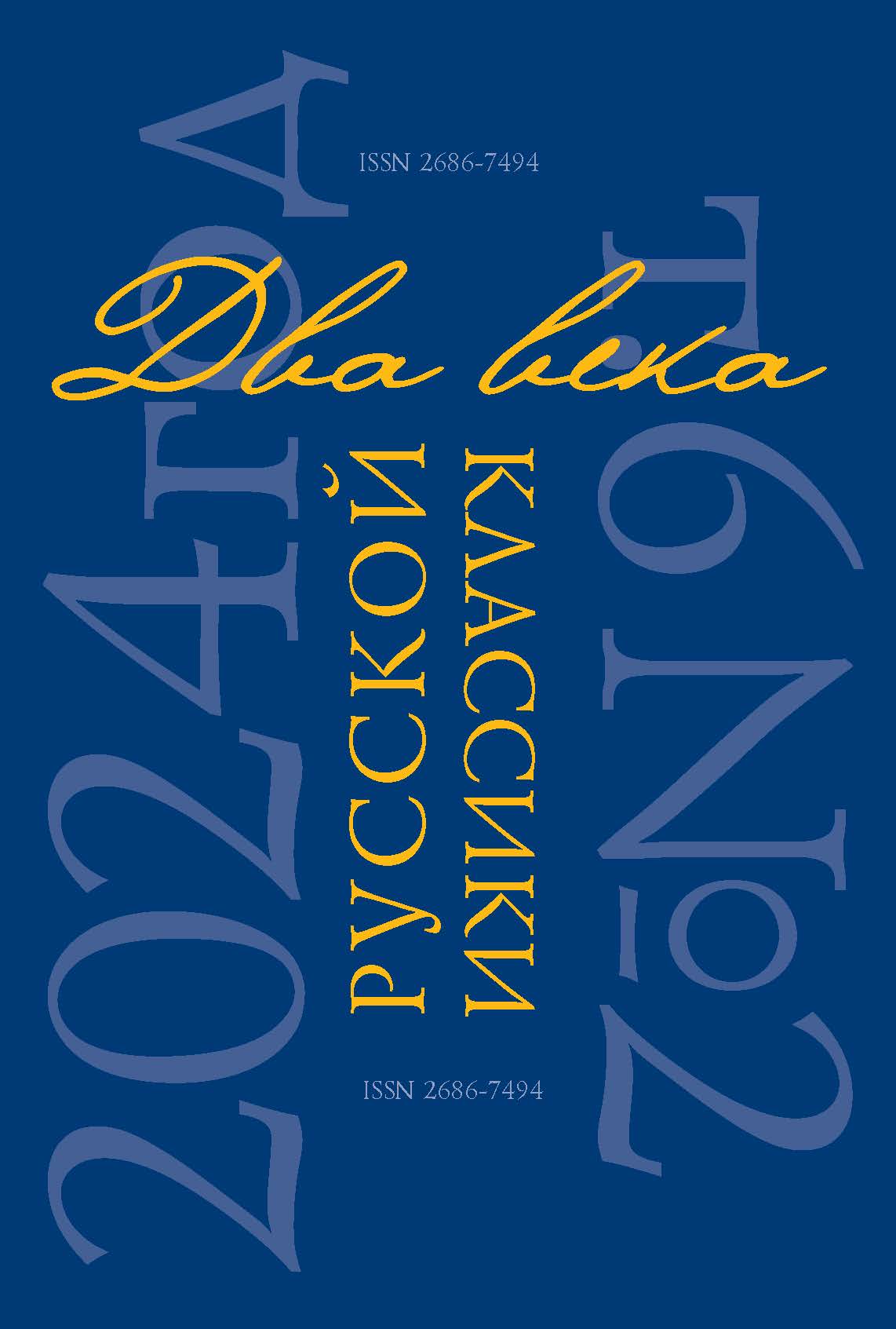Abstract:
In F. M. Dostoevsky’s works and working notes there are medical terms and expressions written in Latin. The article provides a textual description of these foreign language inserts and analyzes their stylistic and ideologically meaningful functions. The Latin names of diseases used by Dostoevsky denote fever, feverish states and act more as stylistic means. Terminological inserts are also used in relation to the image of a doctorresident from the story “Notes from the House of the Dead”. On one hand, the inserts mark the hero’s professional affiliation, and on the other, they graphically mark the boundaries of the prisoner’s “rest” in the hospital. The use of a Latin aphorism, which goes back to the dictum of Hippocrates, in the novel “The Adolescent” is noteworthy. It is known that Dostoevsky relied on the published protocols of the trial of N. A. Dolgushin’s secret society. One of the protocols contained the saying of Hippocrates written on the wall of Dolgushin’s room, but in Russian translation. In his working notes, Dostoevsky always writes an aphorism in Latin. This gives grounds to assume that through an appeal to the Latin primary source, the writer shows the transformation of humanistic values in modern society at the substantive and stylistic levels.
References
Anikin, A .A. “Obraz vracha v russkoi klassike” [“The Image of a Doctor in the Russian Classics”]. Obrazovatel’nyi portal “Slovo”. Filologiia [Educational Portal “Slovo”. Philology]. Available at: www.portal-slovo.ru/philology/37293.php?ELEMENT_ID=37293.html (Accessed 22 June 2021). (In Russ.)
Baranova, I. A. “Literatura i meditsina: transformatsiia obraza vracha v russkoi literature XIX veka” [“Literature and Medicine: Transformation of the Doctor’s Image in Russian Literature of the 19th Century”]. Vestnik Samarskoi gumanitarnoi akademii. Seriia: Filosofiia. Filologiia, no. 2 (8), 2010, pp. 186–194. (In Russ.)
Vishniakova, E. A. “K voprosu ob inoiazychnykh vkrapleniiakh v epistoliarii russkikh klassikov XIX veka: V. A. Zhukovskii i K. N. Batiushkov” [“On Foreign Language Inclusions in the Epistolary of Russian Classics of the 19th Century: V. A. Zhukovsky and K. N. Batyushkov”]. Vestnik tomskogo gosudarstvennogo pedagogicheskogo universiteta, no. 6 (195), 2018, pp. 92–99. (In Russ.)
Gatina, Z. S., Vishlenkova, V. A. “Sistema nauchnoi attestatsii v meditsine v Rossii v pervoi polovine XIX veka” [“The System of Scientific Certification in Medicine in Russia in the First Half of the 19th Century”]. Vestnik Sankt-Peterburgskogo gosudarstvennogo instituta kul’tury, no. 1 (18), 2014, pp. 168–178. (In Russ.)
Dorovskikh, L. V. “Latinskie vkrapleniia v perepiske A. P. Chekhova” [“Latin Inclusions in the Correspondence of A. P. Chekhov”]. Filologicheskii klass, no. 24, 2010, pp. 60–66. (In Russ.)
Diagileva, I. B. “Latinskie slova i vyrazheniia v russkikh gazetakh pervoi poloviny XIX veka” [“Latin Words and Expressions in Russian Newspapers of the First Half of the 19th Century]. Akademik A. A. Shakhmatov: zhizn’, tvorchestvo, nauchnoe nasledie (k 150-letiiu so dnia rozhdeniia) [Academician A. A. Shakhmatov: Life, Work, Scientific Heritage (to the 150th Anniversary of His Birth)]. St. Petersburg, Nestor-Istoriia Publ., 2015, pp. 536–541. (In Russ.)
Il’chenko, O. S. “Latinskie vkrapleniia v russkoi literature vtoroi poloviny XIX veka” [“Latin Inclusions in Russian Literature of the Second Half of the 19th Century”]. Russian Linguisyic Bulletin, no. 3 (23), 2020, pp. 140–144. (In Russ.)
Koshechko, A. N. “Bolezn’ kak ekzistentsial’nyi fenomen v tvorcheskom soznanii F. M. Dostoevskogo” [“Disease as an Existential Phenomenon in the Creative Mind of F. M. Dostoevsky”]. Vestnik Kemerovskogo gosudarstvennogo universiteta, no. 3, 2012, pp. 285–289. (In Russ.)
Krasnova, T. V. Inoiazychnye vkrapleniia v russkoi literaturnoi rechi nachala XX veka [Foreign Language Inclusions in Russian Literary Speech at the Beginning of the 20th Century: PhD Thesis, Summary]. Voronezh, 2009. 25 p. (In Russ.)
Kuznetsov, O. N., Lebedev, V. I. Dostoevskii nad bezdnoi bezumiia [Dostoevsky Over the Abyss of Madness]. Moscow, Kogito-tsentr Publ., 2003. 232 p. (In Russ.)
Kuleva, A. S., Shestakova, L. L. “Inoiazychnye vkrapleniia v tekstakh poetov Serebrianogo veka (po materialam svodnogo slovaria poeticheskogo iazyka)” [“Foreign Language Inclusions in the Texts of the Poets of the Silver Age (Based on the Materials of the Consolidated Dictionary of the Poetic Language)”]. Izvestiia RAN. Seriia literatury i iazyka, vol. 74, no. 1, 2015, pp. 68–76. (In Russ.)
Mirzoeva, V. M., Tolkacheva, N. N. “Kontseptosfera ‘bolezn’’ v tvorchestve F. M. Dostoevskogo” [“The Concept of ‘Disease’ in the Works of F. M. Dostoevsky”]. Vestnik Tverskogo gosudarstvennogo universiteta, no. 1, 2016, pp. 135–140. (In Russ.)
Mochul’skii, K. V. Gogol’. Solov’ev. Dostoevskii [Gogol. Solovyov. Dostoevsky]. Moscow, Respublika Publ., 1995. 273 p. (In Russ.)
Nilova, A. Iu. “Latinskii iazyk v tvorchestve F. M. Dostoevskogo” [“Latin Language in the Works of F. M. Dostoevsky”]. Fortunatovskie chteniia v Karelii [Fortunatov Proceedings in Karelia]. Petrozavodsk, Petrozavodskii gosudarstvennyi universitet Publ., 2018, pp. 36–39. (In Russ.)
Piotrovskii, R. G., Rabukho, N. P., Khazhinskaia, M. S. Sistemnoe issledovanie leksiki nauchnogo teksta [Systematic Study of the Vocabulary of a Scientific Text].
Kishinev, Shtiintsa Publ., 1981. 159 p. (In Russ.)
Ponomareva, G. B. “Dostoevskii — syn vracha i vrachevatel’ bol’nogo mira (k 185-letiiu so dnia rozhdeniia)” [“Dostoevsky as a Son of a Doctor and Healer of the Sick World (to the 185th Anniversary of His Birth)”]. Vrach, no. 1, 2007, pp. 76–78. (In Russ.)
Ruzhitskii, I. V. Iazykovaia lichnost’ F. M. Dostoevskogo: leksikograficheskoe predstavlenie [Linguistic Personality of F. M. Dostoevsky: Lexicographic Presentation: DSc Thesis, Summary]. Ekaterinburg, 2015. 57 p. (In Russ.)
Saimon, K. “Latinskie tsitaty v ‘Putevykh zapiskakh’ arkhiepiskopa Nila (Isakovicha)” [“Latin Quotations in the ‘Travel Notes’ by Archbishop Nil (Isakovich)”]. Filaretovskii al’manakh, no. 4, 2008, pp. 77–92. (In Russ.)
Skoropadskaia, A. A. “Strepitu belli propelluntur artes: latinskii aforizm Dostoevskogo” [“Strepitu Belli Propelluntur Artes: Dostoevsky’s Latin Aphorism”]. Neizvestnyi Dostoevskii, vol. 7, no. 4, 2020, pp. 208–221. (In Russ.)
Sokolova, O. V. Ot avangarda k neoavangardu: iazyk, sub”ektivnost’, kul’turnye perenosy [From Avant-garde to Neo-avant-garde: Language, Subjectivity, Cultural Transfers]. Moscow, Kul’turnaia revoliutsiia Publ., 2019. 294 p. (In Russ.)
Khalikov, M. M. “Polilingvizm khudozhestvennogo mira F. M. Dostoevskogo” [“Polylinguism of the Artistic World of F. M. Dostoevsky”]. Izvestiia Samarskogo nauchnogo tsentra Rossiiskoi akademii nauk. Sotsial’nye, gumanitarnye, mediko-biologicheskie nauki, no. 76, 2021, pp. 98–109. (In Russ.)
Cherniavskii, M. N. “Kratkii ocherk istorii i problem uporiadocheniia meditsinskoi terminologii” [“A Brief Outline of the History and Issues of Medical Terminology Streamlining”]. Entsiklopedicheskii slovar’ meditsinskikh terminov: v 3 t. [Encyclopedic Dictionary of Medical Terms: in 3 vols.], vol. 3. Moscow, Sovetskaya entsiklopediia, 1984, pp. 411–425. (In Russ.)
Chulkov, G. I. Kak rabotal Dostoevskii [How Dostoevsky Worked]. Moscow, Iurait Publ., 2019. 217 p. (In Russ.)









